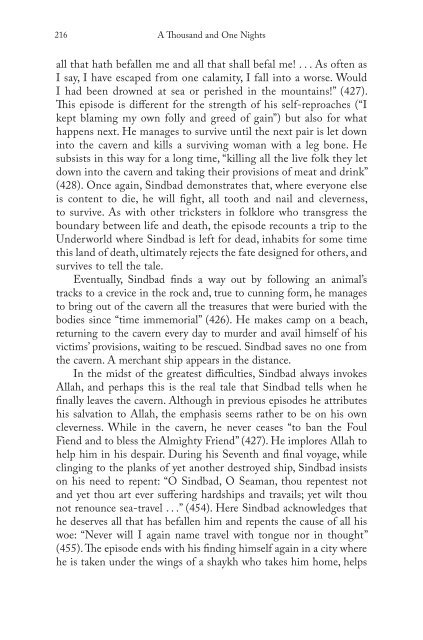Blooms Literary Themes - THE TRICKSTER.pdf - ymerleksi - home
Blooms Literary Themes - THE TRICKSTER.pdf - ymerleksi - home
Blooms Literary Themes - THE TRICKSTER.pdf - ymerleksi - home
You also want an ePaper? Increase the reach of your titles
YUMPU automatically turns print PDFs into web optimized ePapers that Google loves.
216<br />
A Th ousand and One Nights<br />
all that hath befallen me and all that shall befal me! . . . As often as<br />
I say, I have escaped from one calamity, I fall into a worse. Would<br />
I had been drowned at sea or perished in the mountains!” (427).<br />
Th is episode is diff erent for the strength of his self-reproaches (“I<br />
kept blaming my own folly and greed of gain”) but also for what<br />
happens next. He manages to survive until the next pair is let down<br />
into the cavern and kills a surviving woman with a leg bone. He<br />
subsists in this way for a long time, “killing all the live folk they let<br />
down into the cavern and taking their provisions of meat and drink”<br />
(428). Once again, Sindbad demonstrates that, where everyone else<br />
is content to die, he will fi ght, all tooth and nail and cleverness,<br />
to survive. As with other tricksters in folklore who transgress the<br />
boundary between life and death, the episode recounts a trip to the<br />
Underworld where Sindbad is left for dead, inhabits for some time<br />
this land of death, ultimately rejects the fate designed for others, and<br />
survives to tell the tale.<br />
Eventually, Sindbad fi nds a way out by following an animal’s<br />
tracks to a crevice in the rock and, true to cunning form, he manages<br />
to bring out of the cavern all the treasures that were buried with the<br />
bodies since “time immemorial” (426). He makes camp on a beach,<br />
returning to the cavern every day to murder and avail himself of his<br />
victims’ provisions, waiting to be rescued. Sindbad saves no one from<br />
the cavern. A merchant ship appears in the distance.<br />
In the midst of the greatest diffi culties, Sindbad always invokes<br />
Allah, and perhaps this is the real tale that Sindbad tells when he<br />
fi nally leaves the cavern. Although in previous episodes he attributes<br />
his salvation to Allah, the emphasis seems rather to be on his own<br />
cleverness. While in the cavern, he never ceases “to ban the Foul<br />
Fiend and to bless the Almighty Friend” (427). He implores Allah to<br />
help him in his despair. During his Seventh and fi nal voyage, while<br />
clinging to the planks of yet another destroyed ship, Sindbad insists<br />
on his need to repent: “O Sindbad, O Seaman, thou repentest not<br />
and yet thou art ever suff ering hardships and travails; yet wilt thou<br />
not renounce sea-travel . . .” (454). Here Sindbad acknowledges that<br />
he deserves all that has befallen him and repents the cause of all his<br />
woe: “Never will I again name travel with tongue nor in thought”<br />
(455). Th e episode ends with his fi nding himself again in a city where<br />
he is taken under the wings of a shaykh who takes him <strong>home</strong>, helps

















